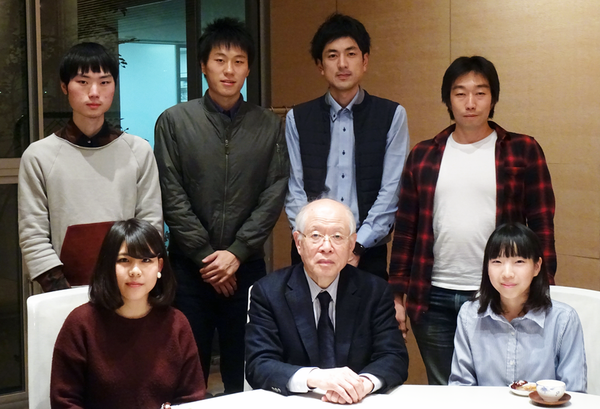Since January 2013, University Prof. Ryoji Noyori, a Nobel Laureate in Chemistry (2001), has contributed numerous articles to "Kamitsubute" in Chunichi Shimbun. Based on these articles, he holds regular academic discussions with students at Nagoya University. At the 23rd Noyori Academy Salon, held on December 9, 2016, Prof. Noyori and five students from various academic fields openly discussed "Deficiency, the Power to Produce a Slew of Ideas." Prof. Noyori claimed that innovation is created with the power to overcome difficulties, including lack of resources.

Jang Hyunggyu, a freshman at the School of Engineering, Nagoya University
I understand your explanation that people gain power when faced with severe deficiency. On the other hand, I believe that the accumulation of intellectual properties is a factor contributing to making the country rich.
Prof. Noyori
Innovation not only results in the creation of new technology but also changes values in a society. For example, Israel has the power to produce innovative changes beyond political and military affairs. Former Israeli president Shimon Peres, a Nobel laureate in Peace (1994), said: “In Israel, a land lacking in natural resources, we learned to appreciate our greatest national advantage: our minds. Through creativity and innovation, we transformed barren deserts into flourishing fields and pioneered new frontiers in science and technology.” Israel emphasizes the importance of education, especially mathematics, as the commencement of science.
Airi Suzuki, a junior at the School of Education, Nagoya University
What is the specific difference between Israel and Japan in terms of the educational atmosphere?
Prof. Noyori
In Israel, men and women must mandatorily serve in the military before entering universities. During their service, they not only learn the latest technology but also the importance of human lives. Besides, we, the Japanese people, lived through turbulent days immediately after World War II. We had asked ourselves “how to survive” without any food. ーThis has remained a global issue; therefore, to break away from poverty, people throughout the world should discuss and align ideas and implement them by working together.
Mana Ooguchi, a freshman at the School of Economics, Nagoya University
Affluence causes social imbalance. How can we ensure complete efforts, especially from those who are materially affluent?
Prof. Noyori
This is the so-called disparity in economics. The gap between people in society unfortunately widens depending on who is governing. Prof. Hirofumi Uzawa, an economist, in the “Social Common Capital” claimed that nature’s possessions, such as water and air, are our common capital and must not be monopolized. People in developed countries may be too unaffected to understand, being in such an affluent atmosphere.
Kei Kaneko, a visiting researcher at the Graduate School of Medicine, Nagoya University
Being in Japan, I am more aware of the problems occurring in Japan.
Prof. Noyori
What do you think is the standard for welfare between mind and matter? It is necessary to understand that there are people who do not have fresh water to drink. This is truly an example of imbalance in the world. When setting a research agenda, you are intended to consciously consider how important it is to the world.
Cao Chen, a second year student at the Graduate School of Language and Culture, Nagoya University
The thought process in our current society is different from that in the past. Information is available equally to everyone today, something that was not possible earlier.
Prof. Noyori
Society will keep altering as time passes. Today, the information revolution has a huge impact and causes significant development. However, we must not forget the two phrases: “Back to Nature” and “Back to Humanity.” We should also be aware of the global standard, “World in One.” To cope with a societal issue that goes beyond science and technology, there is a need to earnestly discuss this by increasing intermingling between people and merging ideas.
(by Ayako Umemura/NU Research)